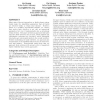Free Online Productivity Tools
i2Speak
i2Symbol
i2OCR
iTex2Img
iWeb2Print
iWeb2Shot
i2Type
iPdf2Split
iPdf2Merge
i2Bopomofo
i2Arabic
i2Style
i2Image
i2PDF
iLatex2Rtf
Sci2ools
122
click to vote
DAC
2012
ACM
2012
ACM
Towards fault-tolerant embedded systems with imperfect fault detection
Many state-of-the-art approaches on fault-tolerant system design make the simplifying assumption that all faults are detected within a certain time interval. However, based on a detailed experimental analysis, we observe that perfect fault detection is not only an impractical assumption but even if implementable also a suboptimal design decision. This paper presents an approach that takes imperfect fault detection into account. Novel analysis and optimization techniques are developed, which distinguish detectable and undetectable faults in the overall workflow. Besides synthesizing the task schedules, our approach also decides which of the available fault detectors is selected for each task instance. Experimental results show that our approach finds solutions with several orders of magnitude higher reliability than current approaches. Categories and Subject Descriptors B.8.1 [Performance and Reliability]: Reliability, Testing, and Fault-Tolerance; C.3 [special-purpose and applicatio...
Computer Architecture | DAC 2012 | Fault Tolerant System | Reliability Design | Tolerant System Design |
Related Content
| Added | 29 Sep 2012 |
| Updated | 29 Sep 2012 |
| Type | Journal |
| Year | 2012 |
| Where | DAC |
| Authors | Jia Huang, Kai Huang, Andreas Raabe, Christian Buckl, Alois Knoll |
Comments (0)

